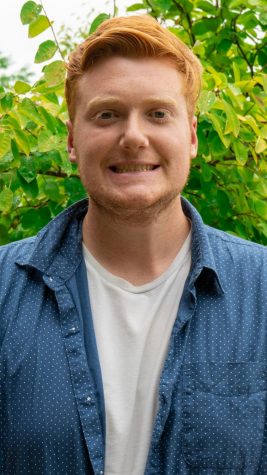News on News: institutional student censorship isn’t a strictly American phenomenon
Apr 2, 2020
Over the course of the semester, the Lanthorn will be conducting an editorial and column series titled “News on News” revolving around how news is consumed today, the concept of ‘fake news’ and the fight journalists continue to fight to have their voices be heard.
In the second edition of this series, I sat down with former Lanthorn editor-in-chief and current Holland Sentinel editor-in-chief Audra Gamble to discuss the institutional censorship that the paper faced, both in 2013 and in 2020.
While going through institutional censorship is something that no journalist or student wants to deal with, Gamble and I are lucky in that we are both Americans and have First Amendment “Freedom of Speech” and “Freedom of the Press” rights that can protect us.
Unfortunately, those same laws are not prevalent all over the world, as students from every corner of the earth are facing censorship from the powers that be, whether those powers be from the university they attend or from the country they are a resident in.
The former of those powers came to attack GVSU student senator Artur Koldomasov, a Ukrainan student hailing from the National University of Ostroh Academy (NUOA), who decided to come to GVSU as part of a study abroad program with his host school.
Being that Koldomasov is in the final few months of finishing up in his undergraduate degree, he was forced as part of his studies to write a letter to NUOA about how GVSU was as a school in order to gain information about the school to decide whether or not future students should go there.
When Koldomasov first read his published school letter in a university following his initial submission, he saw that his quotes were fabricated to make GVSU look like an embarrassment compared to NUOA.
“Somebody told (my host school) that I taught you something bad about the university outside of the university,” Koldomasov said, referring to NUOA. “In some conversations I had had with the representative of the university administration, after I wrote my blog, they said they were going to move some quotes around, but I had no idea it was going to change this drastically. It wasn’t my words anymore.”
Unfortunately for students all across Ukraine, Koldomasov’s story is far from a unique one.
“Unfortunately, censorship is not limited to only my case,” Koldomasov said. “There were some cases when students actually got expelled because of what they posted about the university on social media. Censorship is not only an issue at my institution, but also at other European and Carribbean institutions everywhere.”
Similar to actions taken by the university following the Morris Berger story being published in the Lanthorn, Koldomasov cited the censorship of his letter on the school’s blog to be seen as a public relations nightmare for his host school.
“Instead of improving the situation and the condition of the university, they care too much about their reputation without any impact,” Koldomasov said. “They pay too much attention to things to these witch hunts when it comes to censoring students when they could be focusing on improving the quality of conditions at the university or the material to study.”
When Koldomasov’s words criticizing his host school and praising GVSU were taken down, he felt sympathy for the workers who write for the news section of the school’s website — some of those workers being students hoping to get into journalism.
“The team who writes articles for the official webpage of the university asked me to do an interview about my experience, and it was a text format, they sent me questions and I had (written) text responses for them,” Koldomasov said. “I wrote honestly about my experience, but the final version of the interview was not sent to me at all, and they cut out certain parts and turned it into a very vanilla piece about how much I love my host university.”
The new version of Koldomasov’s article had him praising Ukrainan professors and their preparation for classes, where he was misquoted in saying that Ukrainan professors were much better than American ones.
This rampant censorship seems to be the elephant in the room amongst the student body at NUOA, but many of the students afraid to speak up about it in fear of being punished by their university.
“We’ve seen students be expelled over these words in a month or less,” Koldomasov said. “It’s one of those things that has the lure of a fantasy, where everybody knows about this, but doesn’t want to talk about it because they are afraid of additional measures, like making their grades worse or dropping their professional reputation. If you make the reputation of the university worse, there will be repercussions.”
Koldomasov is trying to spark some positive change revolving around this issue, eventually getting multiple conversations with the university president about this problem. He hopes to share his story so future students aren’t afraid to speak their mind, but it’s going to be an uphill battle.
“There are problems, but right now it feels like talking to the wall,” Koldomasov said. “People are not interested in hearing us out or interested in changes, so I think it’s almost impossible to change things with the people currently in power with the university. Hopefully time solves this problem and new people coming in change the old way, but it’s hard to change a problem that is on an international level.























